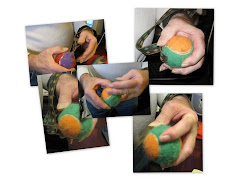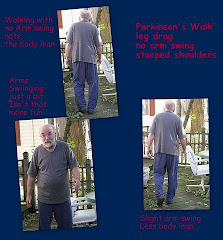While titration downward may cause some symptomatic issues, in the long run your body will thank you. There can be some serious conditions resulting from an abrupt withdrawal. Titrating down from any medication you are discontinuing may be a general rule of thumb until more research is conducted. But there is sufficient research on many meds.
A few weeks one of Steve's doctor prescribed a medication with which I was not familiar. Actually I didn't understand the name he said on the phone and figured I'd just look it up once I had the bottle in hand. (Let that be a lesson to me about being intimidated by an impatient doctor.)
Once home from the pharmacy I began the online search and discovered that this medication could not be taken within 14 days of having an MAOI in the system. So this was not the medication for Steve because he was not giving up the Azilect (an MAO-B inhibitor) which he has been taking since soon after it hit the US market. Although this is a new doctor for Steve, I had provided him with a written list of all meds and regular supplements as well as all symptoms and current issues but he just missed this call. It is important to do your own homework.
A longer time ago than I care to realize, we switched our son from a pediatric to an adult medicine doctor because the peds doc and I weren't in sync. We disagreed too often for either of us to be comfortable. And the worst thing is that I was right far too often. I cite the last incident as an example.
It turned out that a sad prior experience shared with me by our beloved Veterinarian over a distemper puppy from the pound. What we learned about pediatric medicine taught us both about how rapidly respiratory issues can turn on you.
In this case I felt that a sudden temperature shift had turned on my son and I wanted his meds switched immediately. The peds doc disagreed. So off we went to Xray. Brought the pictures back to the nurse and we waited and waited in the room designated for such things while the doc read the Xrays and wrote a new prescription because that was what the Xrays told him was needed. Being right didn't help because the peds doc acknowledged it in a surprising way. He left an anxious mother cooling her heals while a very sick child lay on the bench struggling to breathe and with a rising temp for a very long time. Ostensibly the doc was studying and considering while we waited for him to tell us what he had seen and what could be done.
Instead of meeting with us personally, he actually left the building for lunch. He'd told me off earlier so rather than face me, he made tracks. Finally I ventured through that closed door through which one is not supposed to travel unless invited, found the nurse and was handed the new prescription with no other explanation. And our son, of course, got better.
There are a few points to that story. Be proactive - Don't sit and wait. You or your family member are your only patient, the doctor has plenty. Only you can get things moving. Don't just sit there.
But the story doesn't stopped there. I moved our son to adult medicine and shortly thereafter took him in as a followup. He came out with a prescription for prednisone.
Anyway here was this young boy who had been prescribed a heavy-duty medication and a few weeks later I realized that the bottle was still fairly full - too full. I asked him about it when he returned from school. He said the doctor had told him that he had to ease his way up - take the medication - and ease his way down. So he had titrated up, didn't like the way the steroid made him feel and promptly titrated his way back down.
Just so you know, why didn't I know about what the doc had told him...because at the first appointment this favorite human doctor had gently closed the door in my face saying, "Mom, this isn't Peds - this is adult medicine and you aren't invited." Although I never regretted that move as it served our son well, it did teach me many years later, that when its PD, I want to be in the room. (And to make sure that Steve has signed the necessary release for me to discuss issues with his doctors.)
So that was how I learned about titration. From our pre-teen son.
Ken in England, who sends us links of interest, recently sent us one about DAWS. Dopamine Agonist Withdrawal Syndrome.
Steve reports that when he discontinued the Mirapex, he told his doctor that he was going to titrate down and his doctor told him how to do it. He reports that you should be able to tell if you are titrating down too rapidly; that if you are cutting back to fast your body should respond. Steve was discontinuing Mirapex (a dopamine agonist) and Selegiline (an MAO-B inhibitor) because he had problems with impulse control disorders (ICDs) and hallucinations as serious side effects of the medications. In Steve's case he was not taking levodopa because that was not his first drug of choice and the Mirapex and Selegiline were working well in controlling symptoms.
Reducing dosage of Parkinson's drugs can cause symptoms similar to those of cocaine withdrawal was a study by Dr Melissa Nirenberg and Christina Rabinak at New York-Presbyterian Hospital- Weill Cornell Medical center NY, NY. What is interesting about this study is that it not only focused only on the ICDs, such as shopping, gambling, eating, hyper-sexuality or sexual behaviors, but also focused on levodopa with the implication that there could be an addictive relationship because of the reward implication of the mesocorticolimbic pathways.
The withdrawal symptoms can be diarrhea, dizziness, anxiety, irritability, agitation, chills. Withdrawal symptoms usually abate but they can be confused with other medical or psychiatric causes.
Dopamine Agonists are not the only meds to watch if discontinuing. SSRIs, Selective Serotonin Re-uptake Inhibitors used as antidepressants to treat depression can do exactly the same thing. And, because they can induce more profound detrimental side effects in a Parkinson's patient, are often discontinued. Caution must be taken when titrating down. You should read more about Discontinuation Syndrome is you plan to discontinue your SSRI.
PwPs may have other medical conditions being treated concurrently. It is important to be aware of all interactions so that adverse affects can be monitored and discontinuation done properly.
Withdrawal symptoms are not punishment for people who do illegal drugs, they can happen to anyone.
Additional reading:
addendum 4/02/11 A recent study which is now recruiting: Naltrexone for Impulse Control Disorders in Parkinson's disease















Wow, this just goes to show you that you should not blankly listen to the doctors "advise". Unfortunatly in todays world getting a single doctor's advise is to expensive as it is.
ReplyDeleteThank you for all your insite, and ramblings.